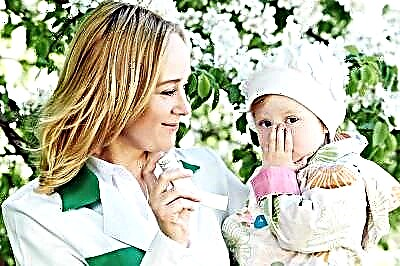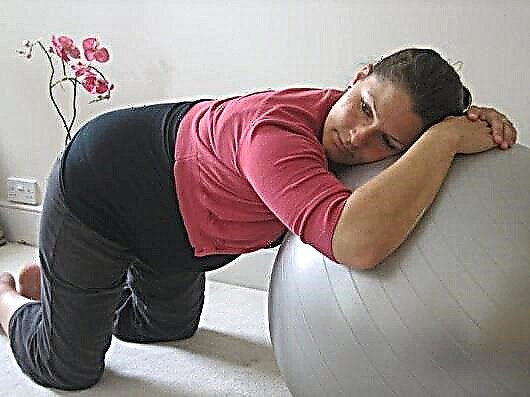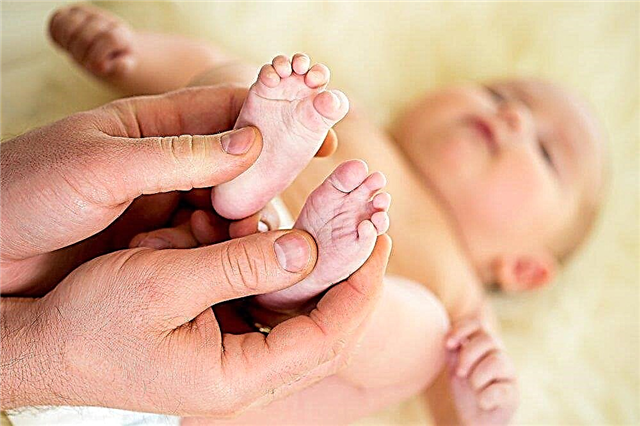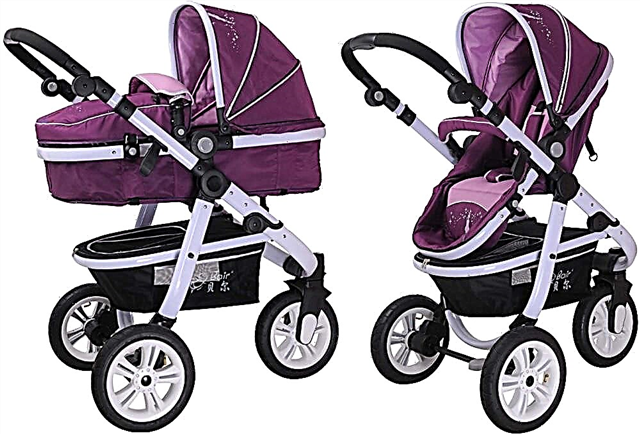
Children prone to allergies may experience an acute or persistent runny nose of an allergic nature. It is often caused by airborne allergens such as dust particles, animal hair, feathers or down from a pillow, pollen. Also, the use of allergens with food or in the form of medicines can lead to the appearance of this type of rhinitis.

Symptoms
Allergic rhinitis in childhood is manifested by the appearance of:
- Nasal congestion.
- Watery nasal discharge, often copious.
- Sneezing attacks.
- Itching in the nose, which can also be in the mouth and ears.
- Swelling of the face.
- Sore throat and unproductive cough.
- Lachrymation, as well as discomfort in the eyes.

Such symptoms are usually characteristic of acute rhinitis caused by a single exposure to an allergen. If a child suffers from a year-round allergic rhinitis, he has:
- The nose will be blocked throughout the year (the intensity of the congestion may vary).
- Periodically, nosebleeds will occur.
- Development of sinusitis and otitis media is possible.
- A nasal voice may appear.
- Snoring will appear during sleep.
In severe cases, rhinitis can interfere with sleep and interfere with daily activities and studies.
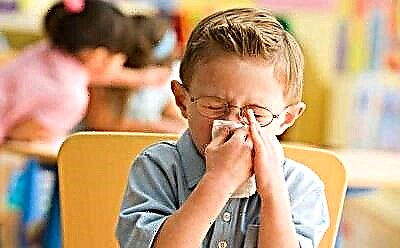
How can you distinguish allergic rhinitis from a common cold?
Since the symptoms of acute rhinitis in ARVI and acute forms of allergic rhinitis are very similar, you need to pay attention to the following differences between these conditions:
- For allergic rhinitis symptoms begin to appear immediately after contact with allergens, and with ARVI, the severity of the common cold increases within several days from the onset of the disease.
- A runny nose caused by an allergen lasts until the child is in contact with this substance, and the duration of ARVI is usually 3-7 days.
- ARVI appears more often in autumn, winter and spring, and rhinitis caused by seasonal allergens occurs during the flowering period.
- Allergic rhinitis is often manifested by excruciating bouts of sneezing, tearing, facial swelling and itching. Such symptoms are very rare in ARVI.
Dr. Komarovsky will tell you how to determine what a baby may be allergic to:
Diagnostics
To confirm the allergic nature of a cold in a child, carry out:
- Interviewing parents to identify genetic predisposition.
- A blood test and nasal discharge to detect eosinophils.
- Skin allergy tests.
- Determination of immunoglobulin E in the blood.
- Rhinoscopy (examination of the nasal cavity using mirrors).
- Ultrasound, CT or X-ray of the sinuses.

How to treat?
All treatment for allergic rhinitis is divided into non-drug and drug treatment. Non-drug actions are to eliminate the effect of the allergen on the child's body or to mitigate its effect:
- If a child reacts with a runny nose to pollen, the time for airing the child's room is reduced, the duration of walks is reduced, and after each walk the child is bathed to remove pollen from the baby's skin and hair. It is advisable to install an air conditioner in the apartment or take the baby out during flowering at sea. All foods, the composition of which is similar to allergens provoking a cold, should be eliminated from the child's diet.
- If the cause of allergic rhinitis is mold spores, then the apartment should be ventilated and cleaned more often than usual. In the fight against mold fungi, fungicides are used.
- If a child has a runny nose due to dust exposure extra attention should be paid to cleaning, dust mite control and bedding. Carpets need to be removed from the house, and it is best to replace upholstered furniture with leatherette or leather items.
- Runny nose due to pet allergy most often forces the pet to be given to friends or relatives. If this is not possible, protect the contact of the child with the animal as much as possible and more often vacuum all rooms.
- If a runny nose appears after eating allergens, at the time of exacerbation, it is important to eliminate any provoking foods from the menu. After a while, they begin to be introduced into the diet in small quantities, monitoring the reaction. In many cases, over time, food stops causing allergies (the child "outgrows").

Medication for allergic rhinitis includes the use of such drugs:
- Antihistamines (Zyrtec, Erius, Allergodil, Desloratadin, Fenistil, Telfast, Claritin, Ketotifen). These medicines are the drugs of choice for allergic rhinitis and help relieve symptoms, including sneezing and itching.
- Local hormonal agents (Budesonide, Mometasone, Beclomethasone, Dexamethasone). These drugs quickly eliminate nasal congestion, itching, sneezing, and other manifestations of the common cold. They are prescribed for a long time, since such drugs act only in the nasal cavity and have practically no general effect.
- Moisturizers (Aquamaris, Salin, Aqualor, Marimer). Such funds cleanse the nasal passages and moisturize the mucous membranes.
- Kromonov (Kromohexal, Lomuzol, Cromolin, Kromosol). Due to their short-term action, such drugs are more often used to prevent allergic rhinitis.
- Vasoconstrictor (Nazivin, Sanorin, Otrivin, Nazol, Tizin). These drugs act locally on the nasal cavity to reduce swelling and nasal congestion. The disadvantage of using them is addiction, the impossibility of long-term use and some side effects (bleeding, dryness, and others).
Treatment of an allergic rhinitis in a child over five years old may include immunotherapy, in which an allergen is injected into the child's body for 3-5 years with a gradual increase in the dose.
Effective remedies
The famous pediatrician Yevgeny Komarovsky on antiallergenic drugs:
Tips
You should not try to treat an allergic rhinitis with any folk remedies. This is not only ineffective, but can also worsen the condition of the child, especially if you use remedies based on medicinal plants. The only acceptable folk recipe experts call rinsing the nose with a solution of sodium chloride, but even this method will help little, if you do not combine it with other measures (elimination of the allergen and drugs).
